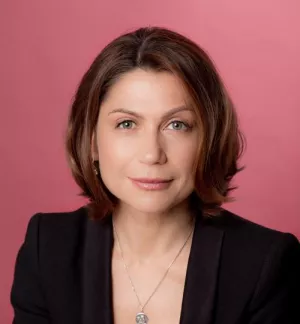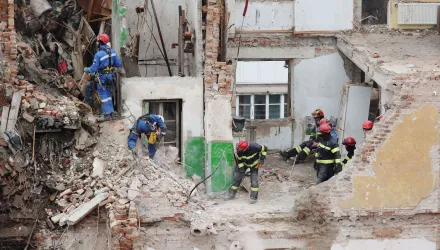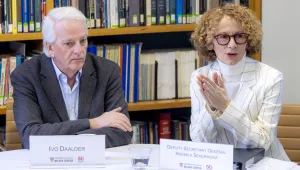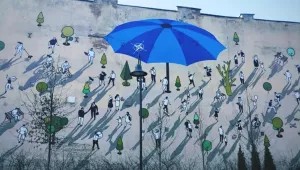Featured in the Spring 2022 Newsletter »
Mariana Budjeryn, a Research Associate with the Center’s Project on Managing the Atom, is a Ukrainian citizen. She grew up in Lviv, Ukraine, and was visiting family there just days before the Russian invasion began. In the video here, recorded on May 4, she shares her perspective of the war and relates how her family and friends in Ukraine are holding up amid this humanitarian catastrophe.
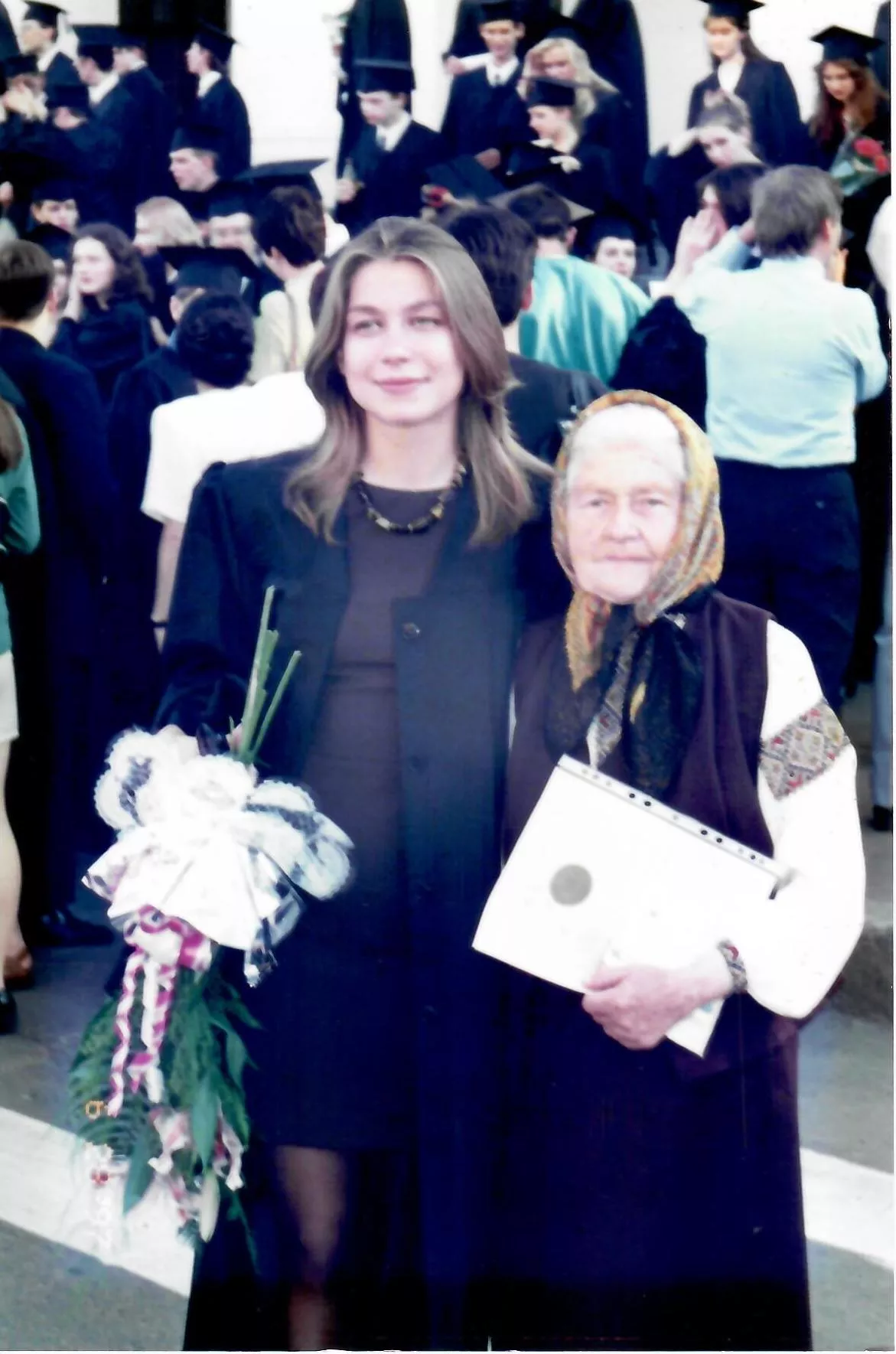
Video Transcript
I’m Ukrainian. I’m born in Ukraine. I went to school there, did my undergrad, worked for several years before leaving the country. I’m from the western city of Lviv, although I went to school, to university, in Kyiv. And most of my family, my mother, my cousins, aunts, they all still live in Ukraine. I have many friends, college friends, personal friends who are still in Ukraine. So of course, even though I have been sort of this global nomad and have been living outside of Ukraine for a long time, it’s my home. And I always go back for holidays or just visits to see my mother as often as I can, and not often enough, sometimes it seems.
In the lead up to this war, I was there for Christmas. This year, I was planning to go for Easter with my son, but it just so happened that in early February, my mom was going in for a surgical procedure and it wasn’t a planned trip. It came up quite suddenly and I just flew out and I was there in the second week of February. By that time, of course, the troops were built being built up along the entire perimeter of the Ukrainian border or Eastern perimeter, I should say, Eastern reaches of the Ukrainian border. And at that point also, the United States was very vigorously, very actively releasing all sorts of intelligence that Russian intentions are for a full scale invasion.
It was a particularly anxious, but also very interesting time to be in Ukraine, of course, anxious, for political reasons and for personal reasons as I was attending to mom, but also I had a chance to get a feel for what it was like to be in a country that’s on the brink of invasion. It was fascinating for me as a scholar. It was a fascinating mixture of a number of different things. One was just this defiance from people that I talked to, young and older; they were prepared. There was worry, but there wasn’t fear. The things that I kept hearing over and over again is, “Well, they come, we’ll face them. We’ll have to face the invading force.”
The other one was a bit of a disbelief, I suppose. So even as the United States was releasing all sorts of intelligence that seemed quite credible, certainly because the source was one of the premier intelligence gathering enterprises in the world, that of the United States, there was this tendency to dismiss these reports and say, “Oh, they’re just kind of escalating the tensions. And why tell people all these things. Maybe this is unnecessary.” Some of the military analysts and security analysts that I follow were also incredulous, but for different reasons. They looked at the correlation of forces in both sides of the borders. And they understood that actually Russians didn’t have enough troops for a successful full scale operation and a number of Ukrainian military analysts said that yes, they will invade, but this will be more limited attacks perhaps at the east, perhaps something to do with the two Eastern “republics,” Luhansk and Donetsk people's republics, maybe grab some more territory around those.
But few people were openly talking about a full scale invasion or were willing rather to give credit to warnings of a full scale invasion. And of course, the president himself, President Volodymyr Zelenskyy, was ambiguous on the issue. He did make several pronouncements saying, "No, we’re not expecting a full scale invasion. No, these reports are premature." And now, as we know, it was a strategic move to placate the people to try to deescalate or assuage some of these anxieties and worries with the population at large, but also to feed this underestimation on the Russian side of just how informed and how prepared Ukrainians might be, because that underestimation ended up being a huge plus for Ukraine and a huge vulnerability for the Russian side.
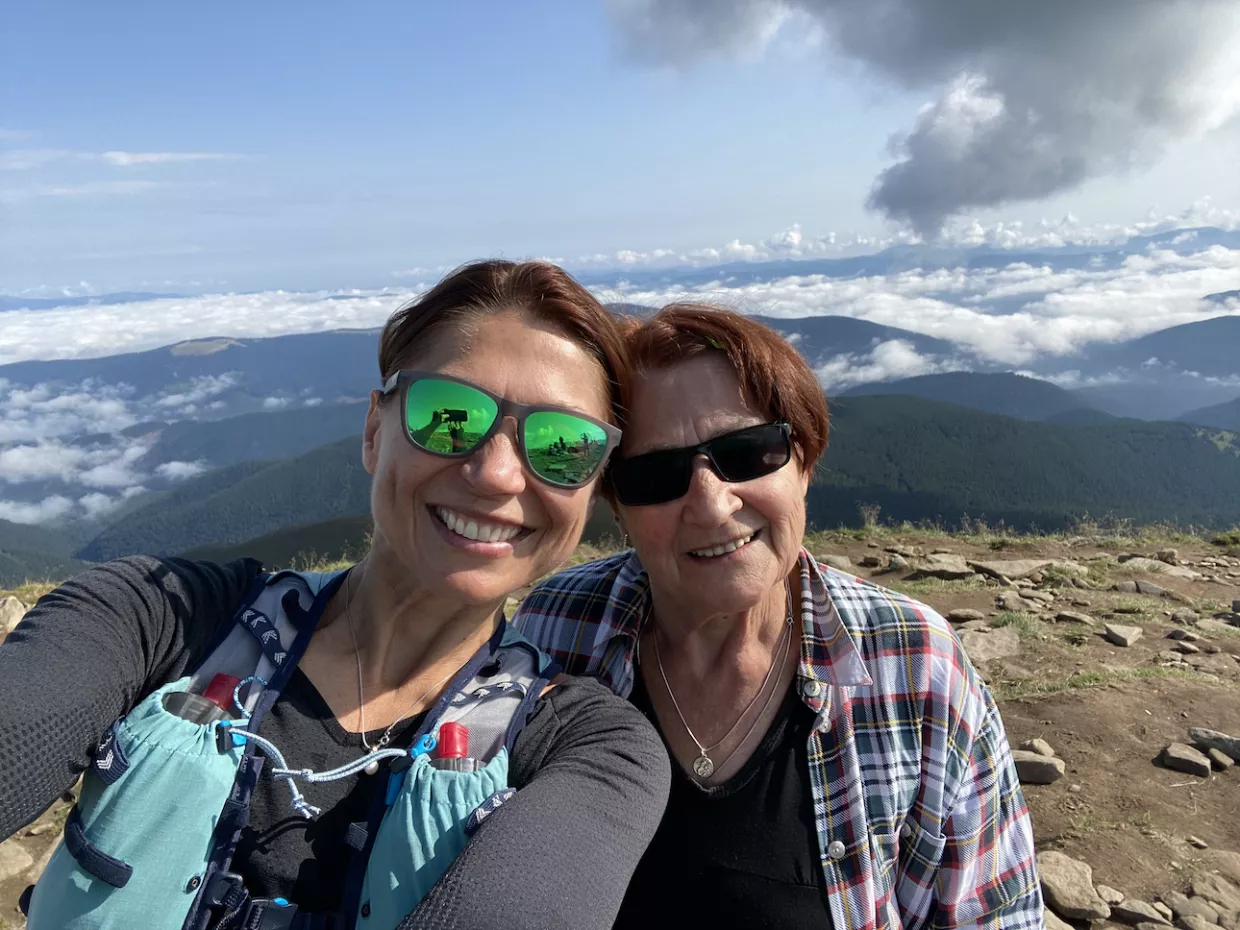
How the war will proceed and what conclusion we can expect, this is a really difficult question. There’s a lot of uncertainty associated with it. Just from communicating with people in Ukraine, with my friends, you go through stages. The first one is as to mobilize and to ride on adrenaline, just to be prepared and to cope with all these shocking news and images through which basically you realize that the entire world in which you live, your whole life has now shifted in a really radical way. You’re in the middle of a war. You went from peacetime to wartime. One of the things in the initial stages of this was toughening up and riding the adrenaline of it.
Another coping mechanisms that seems to still persist is humor. I think there’s great research to be done in the future about the role of humor as a coping mechanism. In a situation of very real and very great peril, Ukrainians are trolling Putin and Russian invading forces mercilessly. There are memes, they flood the social media, and of course, much is being made out of the spirit that sent the Russian warship along its merry way in the very early days of the war. And I think that for morale, but also as a general coping mechanism for civilians, it’s a huge reservoir of strength to be able to still laugh through this terrible situation through tears.
But after this initial stage that's full of adrenaline, there came worry and exhaustion. The images, they mount, they mount, the gore, the tragedy, the plight of ordinary people, the refugees, all of it builds up. And I was really feeling that people were not getting discouraged, but there was suddenly a realization that this will not be a quick war. This will not be something shocking, but quick.
And this first phase of war was very costly for Ukrainians, especially the civilians. We don't know exactly the military losses on the Ukrainian side, but the fierce resistance must have come at a price. This was the price for foiling Putin’s Plan A. This plan did not come to fruition. Kyiv was not taken over; Russian forces withdrew from northern Ukraine. And Ukraine did persist after a month of real tough fighting. That also served as a source of inspiration, a source of strength for many of the people.
Now, fewer people I talk to think that this will be a short war, that this will be over soon. But by now, everyone has found a way to get involved, which is in addition to humor, another really important way of coping and battling this feeling of powerlessness in the face of overwhelming odds, in the face of blind brute force, the injustice and just needless, absolutely pointless violence and suffering.
To watch all this is exasperating. And you feel terrible and powerless because individually, you can do nothing to stop it. But one of the great things that I’ve observed about Ukrainians since I lived there since the collapse of the Soviet Union, and especially through the popular upheavals and revolutions, the so-called Orange Revolution, the Revolution of Dignity, and now, is this civic spirit. And now is this civic spirit. And again, it’s incredible to think that this was formerly a Soviet republic in which the state dominated and citizens were robbed of agency. In some incomprehensible way, in Ukraine, this was overcome and blossomed into really powerful civil society. So everyone is doing something, and it’s one of the ways to cope individually with the stress and trauma of wartime, but also a way to really contribute. So my mother, when she recuperated from her surgery, she started going and making camouflage nets.
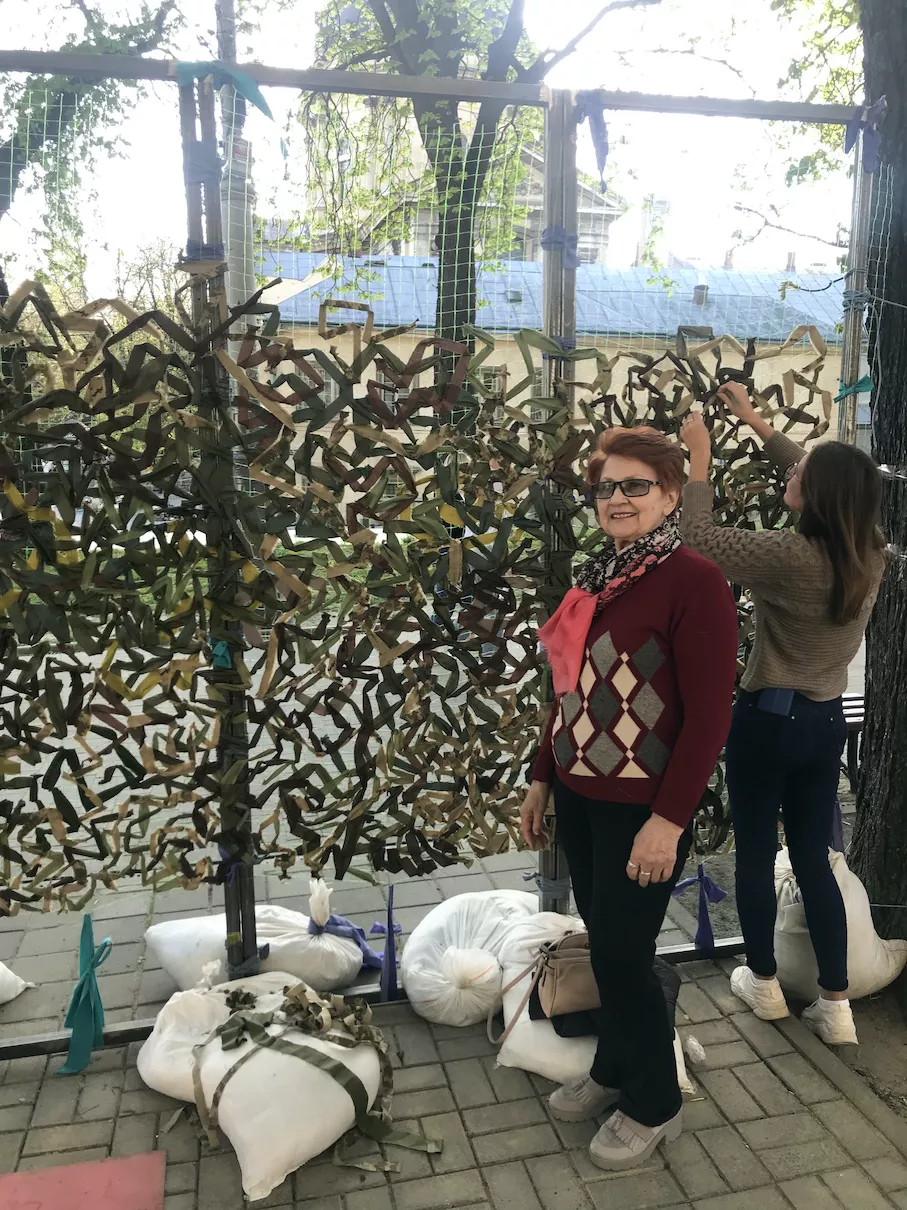
So there’s a center set up in one of the museums downtown, and whoever wants can just walk in there; there are women, mostly women and teenagers, and they’re tying these camouflage colored ribbons, what is basically garden netting. So somebody buys it, or somebody delivers it. Somebody donates the netting; it just miraculously, somehow materializes. And it's stretched on the wall on some kind of frame, and somebody cuts the ribbons into strips and somebody weaves them into the nets. There are other volunteers who come in and tell you news from the front because it’s a tedious and boring job to weave those nets. And they keep you engaged and informed by saying, “Oh, this piece of news just came in from Kyiv or from Kharkiv or from the south.”
Sometimes they’ll bring pizza for people. And none of it is directed from the top. None of it is paid for or organized by any kind of authorities. There are spontaneous centers for redistributing humanitarian aid because of course Lviv became the hub for all of this humanitarian aid arriving. But if you can imagine a humanitarian package would be a couple thousands of pieces of something of some medical supply, something comes in this huge box, and somebody has to break it down, sort things into smaller packages, and figure out how to get it to the places that need these supplies.
Some other friends of mine have gotten involved in a volunteer effort to move businesses, small and medium businesses that have been fleeing from the east. And find for them some premises, whether it’s warehouses or offices, someplace to where they could relocate their business activity from Eastern Ukraine to Western Ukraine, exactly in order to keep the country’s economic life still going, make sure it doesn't suffer more than it already has from the economic losses. And this applies also to Ukrainians abroad. I cannot tell you if I know any Ukrainian who’s outside of the country, any of my friends and acquaintances who somehow are not in one way or another involved either in personally engaging in volunteer effort, or who are not pouring money into this volunteer effort or donating to charities. So it’s really very much a people’s civic effort and a people’s war of defense of their country. And as much as the reasons for this thrust are terrible, it is really inspiring to watch that happen. I think actually a lot of young people around the world and in Western countries could really look up and use that as an example for their own civic engagements.
Since the war started, I’ve heard from a lot of people and some of them I haven’t heard from in years and some of them I’ve never even met in person but who know me indirectly. And maybe the only thing they ever knew about me was that I was Ukrainian. All of these people reached out with their words of concern and words of solidarity. And many of them said, “I know it doesn’t mean much. I feel powerless and nothing really I could do, but at least I can express that.” And that’s wrong. These expressions of solidarity and expressions of concern are incredibly important.
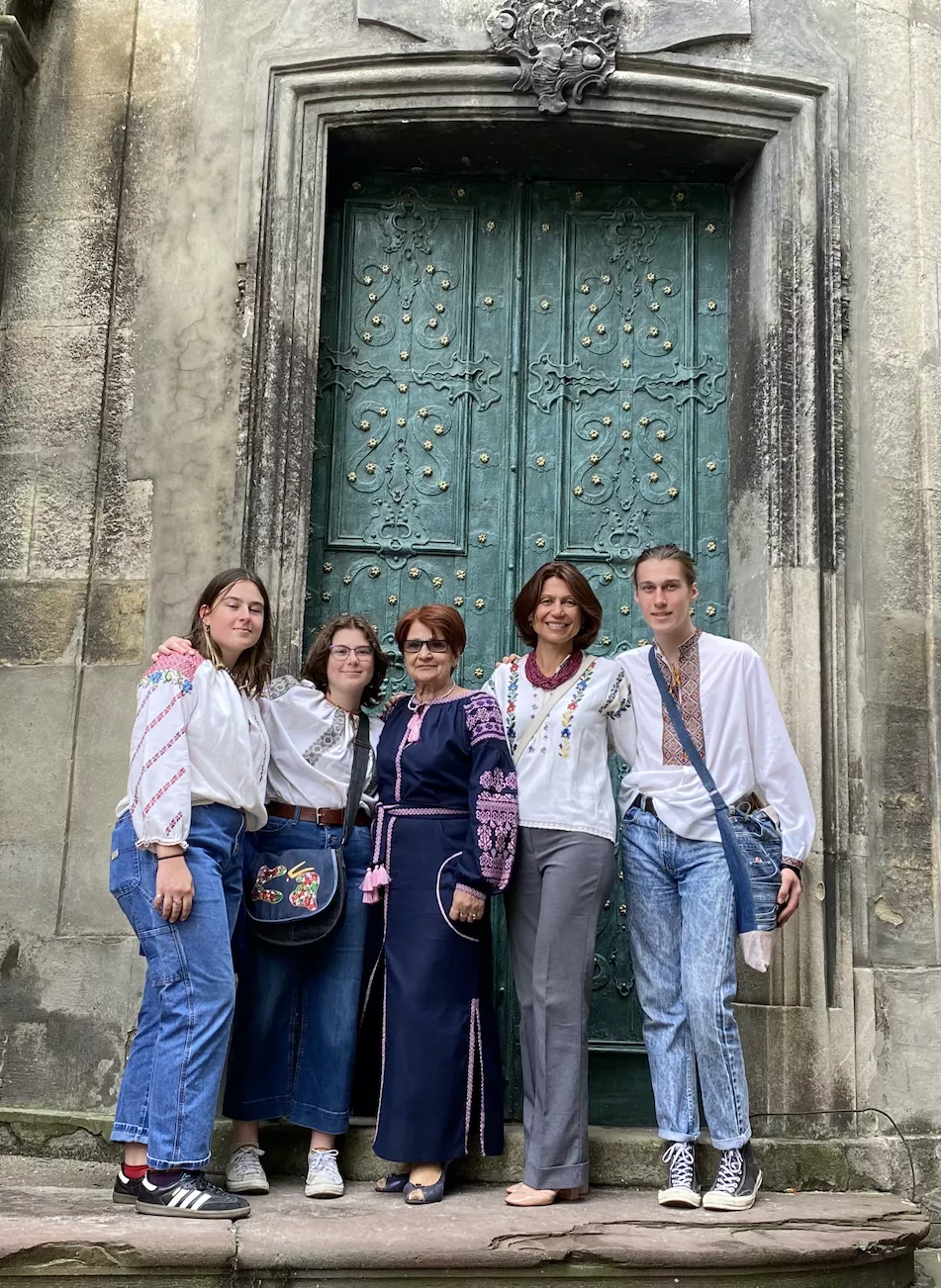
They confirmed that this is a just war of defense against an illegal invasion. This overwhelming international solidarity with the Ukrainian flight is incredibly important including for the people who are actually in the middle of it all fighting the war. To know that there is this effort, this backing from all around the world is incredibly important to these people. I know it’s very important to me who is living a nice and comfortable life here in the United States and not sitting in a trench somewhere in Donetsk. This is to say that these kinds of expressions, no matter how small, have been and will continue to be very valuable for the Ukrainian cause, and for its survival as a state. In my mind, there is no doubt anymore that for the Russian regime this war is a really a war of destruction of Ukraine as we know it, as a sovereign state that is free to decide its own future. That is Putin’s goal right there, there were no limited political goals, otherwise the invasion and the prosecution of this war wouldn’t have looked like it did, the attempt to take the capital and impose Putin’s will, this wonton killing of civilians.
And of course, in addition to the popular outpouring of solidarity worldwide, the support of the governments, the political and economic, and military support coming from Western states, most importantly the United States and the UK, has been a game changer. There’s just so much you can achieve in this war on elan, on morale and spirit, which runs very high with the Ukrainian troops.
The important thing to remember is that Ukraine has been at war for the last eight years, since 2014. It was a hot war, ended by a ceasefire, but no peace settlement, so it settled into this frozen, low intensity pattern. What is happening today, is a continuation, a new spur of escalation. Perhaps the lesson we might take from this is not to wait as an international community until hostilities get started. If you want peace, prepare for war, as the maxim goes. So to prepare the defenses ahead of time and not have to fight and scrape up military equipment in such a way that literally two weeks here or there in terms of arms deliveries can make a difference for the course of war, because it might be too late by the time the equipment arrives to aid the Ukrainian military effort. But this is not to discount just how important Western military aid is for Ukraine’s success in this war.
And finally, perhaps most importantly, what underpins all this intense concoction of emotions – anger at the invaders, defiance in the face of overwhelming odds, despondence for the suffering, pride for the Ukrainian civic and military effort, gratefulness for the incredible international solidarity and support, in word and deed – is faith, a blind, stubborn faith that the Ukrainian people will ultimately prevail and at the end of this terrible ordeal the world will be better than it was before.
This transcript has been edited for clarity.


